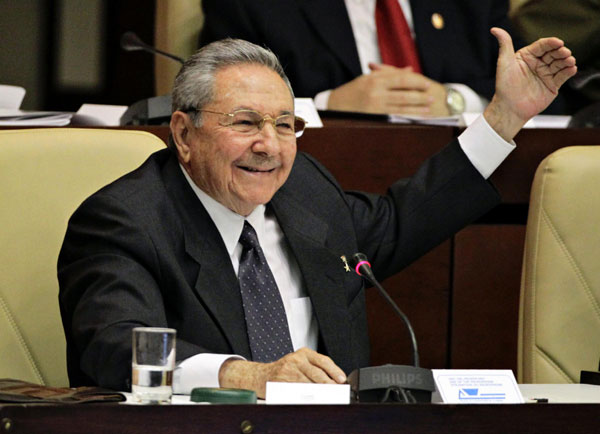Cuban leader Raul Castro reelected to second term
Updated: 2013-02-25 09:34
(Xinhua)
|
|||||||||||
HAVANA - Cuba's National Assembly of People's Power Sunday reelected Cuban leader Raul Castro Ruz to a second five-year term.
The 612-member assembly elected Castro, who turns 82 in June, as president of the State Council.
"The National Assembly of People's Power today approved, in this capital, Army General Raul Castro Ruz as president of the Council of State, and elected Miguel Diaz-Canel Bermudez, as its first vice-president," Cuba's state-run National Information Agency (AIN) said.
Diaz-Canel replaces Jose Ramon Machado Ventura, who will serve as one of five vice-presidents.
Diaz-Canel, 52, served previously as First Secretary of the Cuban Communist Party (CCP) for the central province of Villa Clara and the eastern province of Holguin, as well as Minister of Higher Education.
Joining Machado Ventura as a vice-president will be another stalwart of the Cuban Revolution, Commander Ramiro Valdes.
Cuba's outgoing Vice-President of the State Council Esteban Lazo was elected president of the National Assembly.
Lazo, a member of the Politburo of the Cuban Communist Party ( CCP) since 1985, replaces Ricardo Alarcon de Quesada, 75, who has led the assembly since 1993.
Lazo, who turns 69 on Tuesday and is an economist by training, is considered part of the second generation of Cuban revolutionary leaders. The first group comprises the insurgents led by Fidel Castro who ousted dictator Fulgencio Batista in 1959.
The inaugural session of the 2013-2018 legislature was attended by both Raul Castro and his predecessor Fidel Castro, 86, who retired in 2006 for health reasons, but was elected a deputy for Cuba's second-largest city Santiago de Cuba in general elections Feb 3.
Raul Castro's second term is also expected to be his last, since he recently spearheaded a law that established term limits.
Since officially taking office as president in 2008, Raul Castro has introduced a series of reforms to modernize the country 's aging socialist model, including limited private enterprise, easing travel restrictions and allowing the sale or exchange of private property.
Castro, who turns 82 in June, indicated last Friday that he was considering retirement.
"I'm going to turn 82, I have a right to retire already," Castro told reporters at a public event marking the visit of Russian Prime Minister Dmitry Medvedev.
The new 31-member State Council has 17 new members, and includes 13 women and 12 Afro-Cubans. Their average age is 57.
Related Stories
Raul Castro arrives in Beijing for state visit 2012-07-04 14:43
Raul Castro continues to revamp aging cabinet 2012-03-23 10:36
Fidel and Raul Castro visit Chavez in hospital 2012-03-04 03:03
Raul Castro elected Cuban Communist Party chief 2011-04-20 07:08
Raul Castro backs 10-year maximum term for top positions 2011-04-18 08:04
Cuba's Raul Castro shuffles government 2009-03-03 14:10
Today's Top News
Police continue manhunt for 2nd bombing suspect
H7N9 flu transmission studied
8% growth predicted for Q2
Nuke reactor gets foreign contract
First couple on Time's list of most influential
'Green' awareness levels drop in Beijing
Palace Museum spruces up
Trading channels 'need to broaden'
Hot Topics
Lunar probe , China growth forecasts, Emission rules get tougher, China seen through 'colored lens', International board,
Editor's Picks

|

|

|

|

|

|






